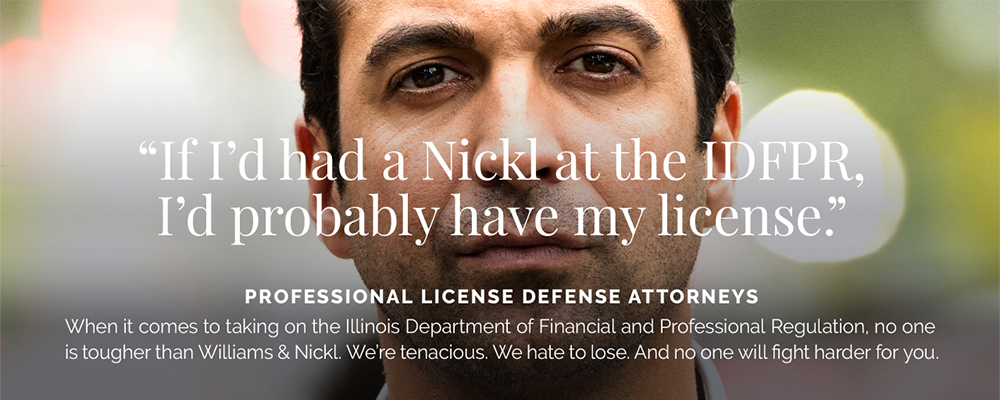
In order to work as a private detective or investigator, a person must complete the proper training and obtain a professional license. They may also need to obtain firearm training and receive a firearm control card (FCC). After completing all of these requirements, private detectives will want to be sure to address any issues that may affect their professional license. When facing disciplinary action or denial of licensure, it is essential to work with an experienced license defense attorney.
At Williams & Nickl, LLC, our lawyers have provided legal help to more than 3,000 licensed professionals throughout the state of Illinois, and we have over 55 combined years of legal experience. Attorney Edward Williams previously served as the Chief of Prosecutions for the Illinois Department of Financial and Professional Regulation (IDFPR), and he and Attorney Fred Nickl provided private detective license examination preparation seminars for more than 25 years. With our understanding of private investigator licensing requirements and IDFPR policies, we can effectively address any issues affecting your professional license.
The Illinois Private Detective, Private Alarm, Private Security, Fingerprint Vendor and Locksmith Board regulates private detective and investigator licenses. Private investigators or private detective agencies may face license discipline for multiple reasons, including:
If you have received a formal Complaint or are facing potential disciplinary action to your private detective license, you may be able to negotiate a Consent Order with an IDFPR prosecutor. However, doing so without the assistance of an attorney is not recommended. In many cases, prosecutors will include conditions in a Consent Order that can cause a wide variety of unexpected consequences to your license and your career.
Before speaking to an IDFPR investigator or prosecutor, you should contact us to discuss your case and learn about your options for defending your license. We will provide you with a free, one-hour consultation, either in-person or over the phone. With our knowledge of the formal and informal policies and procedures followed in IDFPR cases, we can help you determine the best ways to minimize the discipline you may face.
We have defended licensed professionals in many types of license discipline cases, including those involving firearms. In one successful case, we represented a former Marine who was charged and convicted of Reckless Discharge of a Firearm. The IDFPR sought the suspension of his professional license and refused to negotiate. After taking the case to trial, we convinced the Administrative Law Judge to allow our client to keep his license while receiving a simple Reprimand.
Applicants for private detective licenses may receive a Notice of Deficiency Checklist from the IDFPR or a request for additional background information. These queries may ask about instances of discipline in a sister state, previous criminal convictions, or other issues. Before responding to these requests or providing any information to the IDFPR, you should contact us to determine how to proceed. In your complimentary consultation, we will advise you of the best way to respond, and if necessary, we will help you draft a letter of explanation that addresses the IDFPR’s questions. In most cases, we are able to help applicants dispose of these inquiries quickly and effectively, and licenses are often issued within a few days.
When addressing discipline to private detective or investigator licenses, it is important to work with an attorney who understands the applicable laws and statutes, including the Private Detective, Private Alarm, Private Security, Fingerprint Vendor and Locksmith Act of 2004 (225 ILCS 447/5, et seq.) and the Civil Administrative Code of Illinois (20 ILCS 2105/2105-1, et seq.). With our years of experience in IDFPR cases, we can help you take the necessary steps to protect your professional license. To arrange a free consultation, contact us at 312-335-9470.
"*" indicates required fields